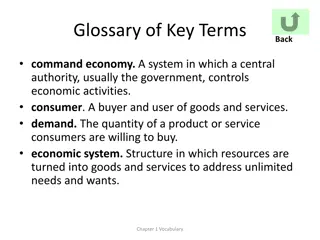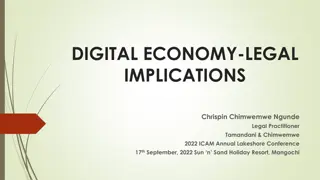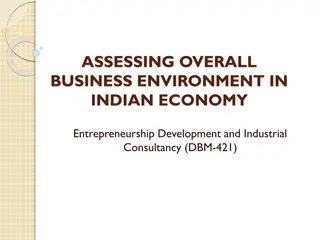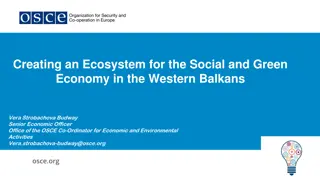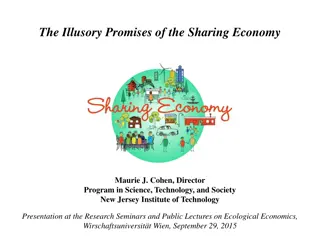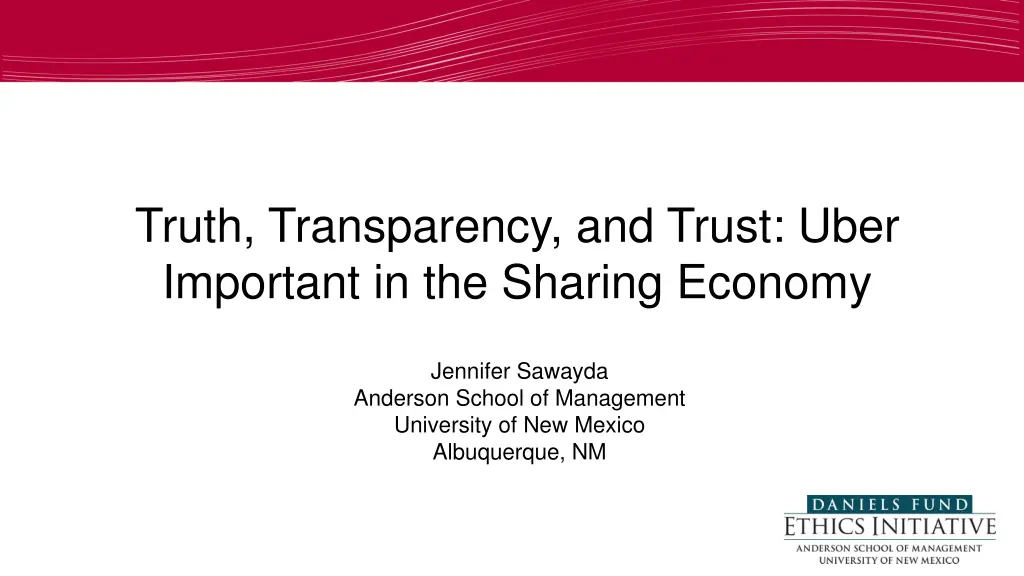
Importance of Truth, Transparency, and Trust in the Sharing Economy
Explore the significance of truth, transparency, and trust in the sharing economy, an economic model centered around the sharing of underutilized assets between private individuals. Learn about the growth of this industry, examples of successful sharing economy platforms like Airbnb and Uber, and the impact of these platforms on various sectors. Discover how the sharing economy is reshaping traditional business models and driving innovation worldwide.
Download Presentation

Please find below an Image/Link to download the presentation.
The content on the website is provided AS IS for your information and personal use only. It may not be sold, licensed, or shared on other websites without obtaining consent from the author. If you encounter any issues during the download, it is possible that the publisher has removed the file from their server.
You are allowed to download the files provided on this website for personal or commercial use, subject to the condition that they are used lawfully. All files are the property of their respective owners.
The content on the website is provided AS IS for your information and personal use only. It may not be sold, licensed, or shared on other websites without obtaining consent from the author.
E N D
Presentation Transcript
Truth, Transparency, and Trust: Uber Important in the Sharing Economy Jennifer Sawayda Anderson School of Management University of New Mexico Albuquerque, NM 1
What Is the Sharing Economy? An economic model that involves the sharing of underutilized assets Person-to-person or peer-to-peer (P2P) Private individuals with an underutilized resource can rent this resource, essentially becoming his or her own entrepreneur People rent rooms, cars, boats, beds, etc. directly from each other Also known as collaborative consumption and piecemeal labor 2
Growth of the Sharing Economy Most of these sharing firms were founded between 2008 and 2010 during the Great Recession Economist article refers to it as post-crisis antidote to materialism and overconsumption Even more traditional companies are investing in the sharing economy Avis, GM, and Daimler all have stakes in sharing companies The sharing economy has become a $26 billion industry 3
Examples Airbnb: Lodging Uber: Ride Sharing Lyft: Ride Sharing $333 million in venture financing TaskRabbit: Chore Marketplace Site matches client that requires a task to be done with someone who has experience in that area Instacart: Grocery delivery Others include Zilok (power tools), HomeAway (houses), Feastly (eat in dining rooms), DogVacay (dog watching), Boatbound (boats), Liquid (bicycles), LendingClub (loans), Fon (Wi-Fi) 4
Airbnb Airbnb website founded in 2008 to connect travelers to those wanting to rent out their extra rooms Connects travelers to lodgings in 34,000 cities in 190 countries $1 billion in revenue; takes 3% commission for its services Popularized the sharing economy concept Advantage: Allows people to earn extra income from their lodgings, beds, and couches Possible Disadvantage: Some critics claim it encourages owners of multiple properties to rent in short-term rather than converting to long- term residences, causing disruptions in urban housing 5
Uber Founded in 2009 as a ride sharing service Uses a mobile app to connect drivers-for-hire with people who need a ride Expanded operations to 250 cities in over 57 countries $10 billion in revenue; $40 billion valuation Offers different services to target different markets UberPop, UberPool, UberX (cheaper services), UberSUV, UberBlack and UberLux (luxury), UberRush (package deliveries) Due to lack of regulation, some of Uber s services are banned or suspended in South Korea, Germany, France, Netherlands, Taiwan 6
Advantages Private individuals can essentially become their own bosses and rent out resources they are not using Became an important way of generating income during recent economic uncertainty Flexibility and chance to be one s own boss Ease of entry It is very easy to enter this market; in fact, competition is quickly heating up, both globally and domestically e.g. Uber competitors include Lyft, Get Taxi (Israel), Didi Kuaidi (China) Convenience and cost savings for customers Interpersonal connections between user and seller Environmental benefits 7
Ethics Issues in the Sharing Economy Regulatory Issues How should these companies be regulated? Should they be taxed like incumbents such as hotels and taxi services? Employees or Independent Contractors? Control of companies over independent contractors Depending upon the company, it can dictate terms such as fees that the contractors must abide by They have the ability to implement changes Policy changes can cause disruptions in demand Safety Issues Letting strangers use your stuff can be dangerous Rape allegations involving Uber 8
Ethics Issues in the Sharing Economy Stability of customers can tend to fluctuate Culpability Issues Many of these companies have insurance, but there have been criticisms that this insurance coverage and their terms are not enough Three states have passed laws related to ride-sharing services putting liability on the car-sharing services and their insurers Could this disempower workers in the long-term? Labor activists claim these are not long-term jobs and puts employees too much under the control of the sharing companies and technology Each sharing company comes with its own set of risks depending upon the industry and the company model 9
Ethics Issues with Uber Employment A California labor commissioner ruled that a driver was an employee because Uber is involved in every aspect of the operation How flexible is Uber? It exerts certain controls over drivers that arguably could place them in a condition of employment Uber may have to give up some of these controls New contracts force drivers into arbitration for disputes Surge pricing Pricing can go up to 6-8 percent higher during peak periods Uber claims it uses surge pricing to get more drivers out on the road during shortages Criticized for using surge pricing during Australian hostage crisis 10
Ethical Issues with Uber cont. Liability After a girl was killed, Uber claimed it was not responsible because the driver was not en route or transporting a passenger before the accident Safety Rape charge in India Ignoring bans Despite bans in Queensland, Australia; New Delhi, India; Cape Town; and Taiwan, Uber services are still in operation there Truthfulness of advertising Uber ads have made it seem that rides are safe There is the impression that fees for Uber rides are cheaper than taxis While these can be true, critics claim that Uber does not have enough controls for safety, and rides are not always cheaper; hence, its advertising is misleading 11
Controls to Deal with Ethical Issues Lyft: Allows drivers to rate riders so they can be on the lookout for dangerous characters Airbnb: 24/7 hotline, trust and safety division, $1 million host guarantee RelayRides: Check users driver records for violations but tends to rely more on user reviews Uber: Refund money for surge pricing during emergencies, added a safe ride checklist, and created a team of safety and fraud experts 12
Conclusions There is no doubt that the sharing economy depends on trust Users must trust independent contractors to get the job done efficiently, safely, and effectively Consumer distrust would have devastating impact on these firms Are companies transparent enough about potential risks? Are they transparent with independent contractors about income potential and company involvement? Past mishaps demonstrate that these companies could improve their transparency among consumers and drivers As the sharing economy continues to evolve, companies are putting in more controls to mitigate risks and increase transparency 13
Sources Airbnb, About Us, https://www.airbnb.com/about/about-us All Eyes on the Sharing Economy, Economist, March 7, 2013, http://www.economist.com/news/technology-quarterly/21572914-collaborative-consumption-technology-makes-it- easier-people-rent-items Rachel Botsman presentation, The Shared Economy Lacks a Shared Definition, Fast Company, November 21, 2013, http://www.fastcoexist.com/3022028/the-sharing-economy-lacks-a- shared-definition Case developed by Noushin Laila Ansari, Lecia Weber, Sederick Hood, Christian Otto, and Jennifer Sawayda, Uber Technologies Inc: Managing Opportunities and Challenges, UNM Daniels Fund Ethics Initiative, http://danielsethics.mgt.unm.edu/pdf/uber-case-study.pdf Marco della Cava, Airbnb Pushes Itself Further and Farther, USA Today, August 20, 2015, 3B Tomio Geron, Airbnband the Unstoppable Rise of the Share Economy, Forbes, January 23, 2013, http://www.forbes.com/sites/tomiogeron/2013/01/23/airbnb-and-the-unstoppable- rise-of-the-share-economy/ Eva GrantSimran Khosla, Here s everywhere Uber is banned around the world, Business Insider, April 8, 2015, http://www.businessinsider.com/heres-everywhere-uber-is-banned- around-the-world-2015-4 John Harvey and Marcus Costello, Sharing Not Always Caring: Problems with the Sharing Economy , Ethics Centre, http://www.ethics.org.au/On-Ethics/Our-articles/April-2015- %281%29/Sharing-not-always-caring-problems-with-the-%E2%80%98shari Christine Lagorio-Chafkin, Brian Chesky, Joe Gebbia, and Nathan Blecharczyk, Founders of Airbnb, Inc., July 19, 2010, http://www.inc.com/30under30/2010/profile-brian-chesky-joe- gebbia-nathan-blecharczyk-airbnb.html Eric Newcomer, Airbnb Overhauls Service for Business Travelers, Bloomberg, July 20, 2015, http://www.bloomberg.com/news/articles/2015-07-20/airbnb-overhauls-service-for- business-travelers Pioneers of the Shared Economy, Forbes, http://www.forbes.com/pictures/eeji45emgkh/airbnb-snapgoods-and-12-more-pioneers-of-the-share-economy/ The Rise of the Sharing Economy, The Economist, May 9, 2013, http://www.economist.com/news/leaders/21573104-internet-everything-hire-rise-sharing-economy Natasha Singer, In the Sharing Economy, Workers Find Both Freedom and Uncertainty, The New York Times, August 16, 2014, http://www.nytimes.com/2014/08/17/technology/in- the-sharing-economy-workers-find-both-freedom-and-uncertainty.html?_r=1 Jason Tanz, How Airbnb and Lyft Finally Got Americans to Trust Each Other, Wired, April 23, 2014, http://www.wired.com/2014/04/trust-in-the-share-economy/ 14

